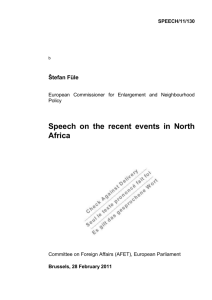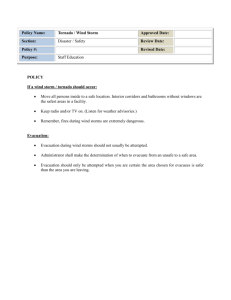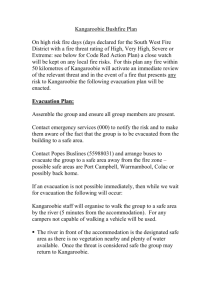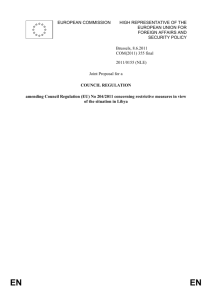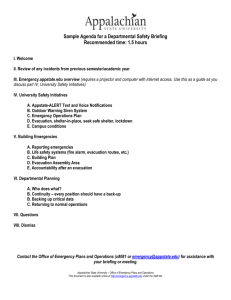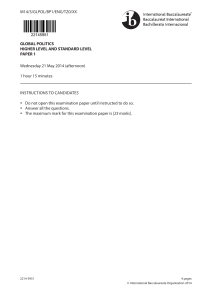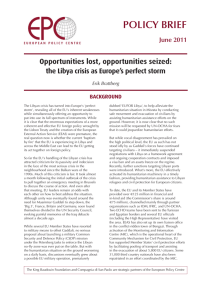DOC - Europa
advertisement
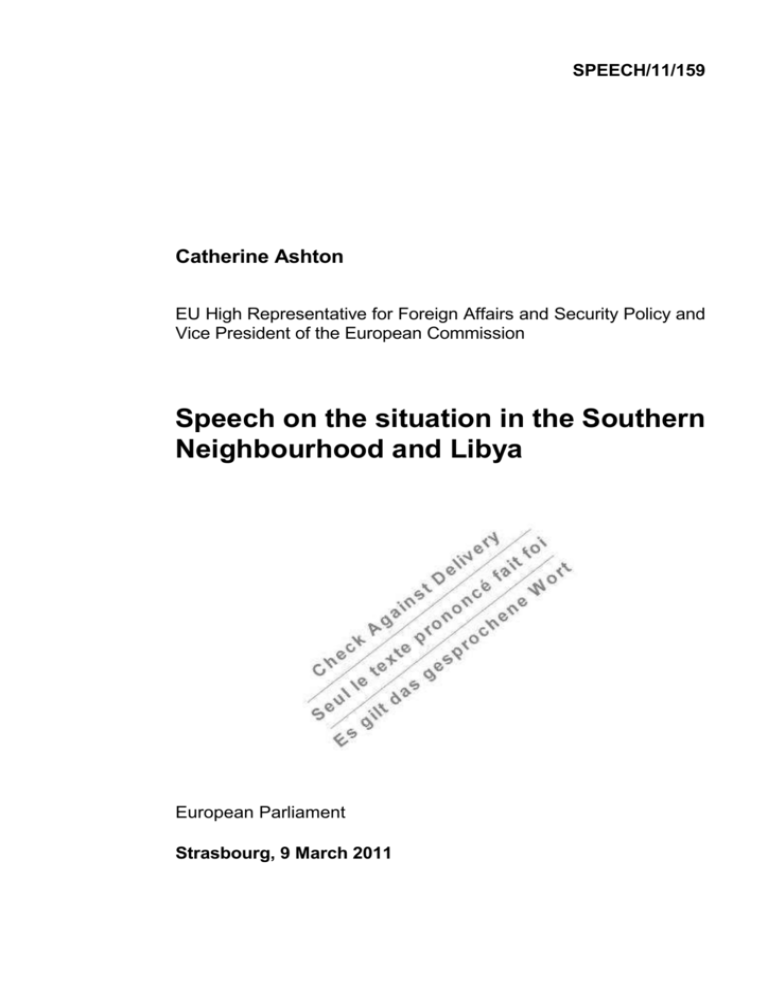
SPEECH/11/159 Catherine Ashton EU High Representative for Foreign Affairs and Security Policy and Vice President of the European Commission Speech on the situation in the Southern Neighbourhood and Libya European Parliament Strasbourg, 9 March 2011 Mr President, Honourable members Our Southern neighbourhood is changing fast. Across the region, people are standing up for that core human aspiration: to be able to shape their own lives, economically and politically. They call for political participation, dignity, accountability, justice and jobs. I believe we should heed these calls for they are just and will not go away. A crucial aspect of what is going on is that the demand for change comes from within. When I visited Tunisia and Egypt, I heard several times: this is our country and our Revolution. But also: we need help. These two principles should guide our actions: the democratic transitions have to be home-grown. It is for the people of the region to determine what lies next. But we should be ready to offer our full support, if asked, with creativity and determination. And do so, on a scale that matches the historic nature of the changes we are seeing. In a fluid situation such as this, our actions should be rooted in our core values and interests. We have every reason to back the changes now underway. Tunisians, Egyptians, Libyans and others are demanding respect for those values that are at the heart of the European ideal. The emergence of democratic societies will help to build sustainable security and shared prosperity in our neighbourhood. That’s why the Commission and I have prepared a joint paper for the European Council on Friday with measures that include more EU financial support, including through the EIB and the EBRD; help with the training and exchange of students, the emergence of a vibrant civil society, more inclusive governance. Food security, further trade opening and mobility partnerships form part of the overall package. Overall, an incentive-based approach is needed, with greater differentiation among countries. The guiding philosophy is "more for more": those partners that go further and faster with reforms should be able to count on greater support from the EU. In the coming days and weeks, we will continue to discuss with international partners how we can co-ordinate efforts to avoid overlap and overload, building on the senior officials' meeting we organized on 23 February. There will be a follow up video conference on Thursday. And after the European Council and informal Foreign Ministers meeting next weekend, I will travel to Egypt to see the Arab League and the new Foreign Minister of Egypt –with whom I have already spoken – Mr Elaraby. But colleagues, In view of the urgency of the situation, let me deal more specifically with Libya. I see two immediate priorities: first, to address the humanitarian crisis and assist with the evacuation; second to ensure that the on-going violence stops and that those responsible are held to account. On the humanitarian situation, the EU has acted swiftly. The Commission has increased its assistance to 30 million euro. I want to pay tribute to my colleague Commissioner Kristalina Georgieva who went to the Tunisian-Libyan border last week to show EU engagement. Member States have also allocated important resources to tackle the immense challenge posed by the continuous flow of people including through FRONTEX. 2 On the evacuation of EU citizens, the European External Action Service has been instrumental in ensuring rapid exchange of information and most effective use of limited resources. Together with the Presidency, I activated the EU Civil Protection Mechanism (MIC) on 23 February to help facilitate the evacuation of EU citizens. Getting information in real time is critical to help us make the right choices so at my request, Agostino Miozzo, the EEAS managing director for crisis response travelled to Tripoli on Sunday and Monday to assess the situation. He met with officials and ambassadors, in a situation that he described as calm, but extremely tense. Our European Ambassadors welcomed the chance to talk in detail and to feed in their analyses – which combined with contacts being made elsewhere help us to establish a clearer picture of the situation. We have quite rightly focused a lot of our efforts on the evacuation of European citizens. We must show our solidarity with Tunisia which is taking the brunt of the challenge. And we should be ready to step up assistance to the Libyan population itself, depending on further developments. In this very fluid situation, I have asked my Services to look, on a prudent planning basis, at possible CSDP engagement to support current evacuation and humanitarian efforts. As always with any CSDP options, they need to be carefully analysed and we will need proper answers on questions of mandate, resources and clear objectives. Mister President, Honourable members, Dealing effectively with the humanitarian crisis is fundamental. Ending the violence is a prerequisite to everything else. That is why I was pleased that the international community as a whole, through its highest authority Security Council has made its position clear: the violence is unacceptable; it must stop and those responsible must be held to account. On the last point, I was pleased that agreement was found in New York on the European demand to include a referral to the Prosecutor of the International Criminal Court who has already started preliminary investigations into alleged war crimes. We are working closely with our partners – the UN, NATO, USA, Turkey, Arab League and many others with who we are in constant contact. And we have our own responsibility. As you know, after the outbreak of violence we immediately suspended the negotiations of the EU-Libya framework agreement together with all technical cooperation. The EU started preparatory work on restrictive measures ahead of the UN Security Council. In addition to the UN sanctions, the EU adopted on 28 February further restrictive measures such as an embargo on equipment which might be used for internal repression and autonomous designations under the travel restrictions and assets freeze. We are now in the process of adding several entities controlled by Qadaffi and his closest associates to that list. The EU will remain at the forefront of international efforts to restore peace and stability in Libya Once we have secured an end to the violence, we have to work to support the emergence of a new Libya where leaders are democratically chosen and people's rights are respected. 3 In line with what we are doing for other countries in the region. Not dictating outcomes but supporting pluralism, accountability, deep democracy and shared prosperity. By their nature, crises are a test for our policies, resources and ability to respond in real time. The events in the Southern Mediterranean represent an enormous challenge for the EU. As vice president of the Commission I believe that how we respond will define this Commission over the coming years. I trust that I can count on your support in our collective effort to bring the EU together. We cannot afford to think small. We cannot afford inflexibility to get in our way. We can and must respond in a strategic way. I believe we can make a real difference, supporting the people of the region as they shape their own future. Mister President, Honourable Members I thank you for the very interesting debate that we have had today which confirms the enormous interest raised by events in the Mediterranean region. The crisis in Libya and the democratisation processes in Tunisia and Egypt will test the EU’s resolve to establish an area of peace and stability in our Mediterranean neighbourhood. We are confronted with an immediate challenge. I have confidence that the extraordinary European Council on 11 March council will be an occasion for the EU to rise to this challenge. 4



